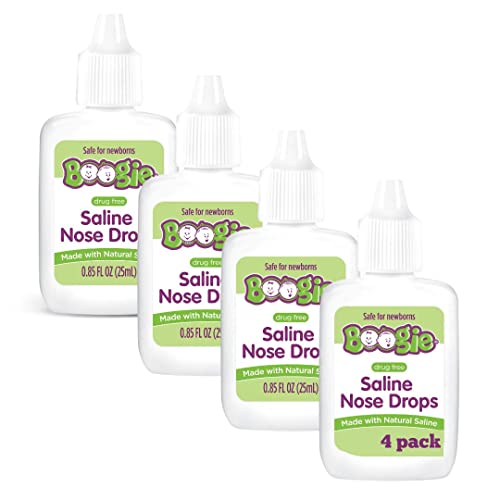Newborn Snoring: Is it Normal or Not?
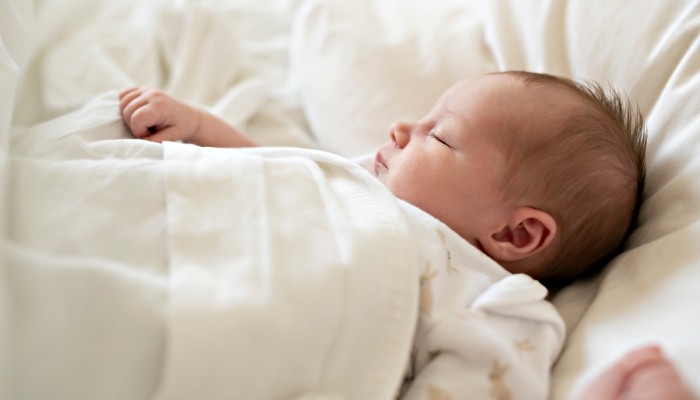
This post may contain affiliate links; please see our terms of use for details.
- The most common cause of snoring in babies is congestion of narrow nasal passages.
- Snoring, when combined with other symptoms, can indicate a problem that requires medical attention.
- Many solutions are available to help a baby who is snoring and can be done at home.
It’s the end of a long day. You place your little one gently in their crib and head to your own bed, ready to fall asleep and enjoy a well-earned rest.
As you’re dozing off, a new sound pierces the dark. A soft, rhythmic snuffle that exactly follows your baby’s breathing pattern.
A quick peek in the crib reveals your baby on their back in a deep sleep, mouth open, and… snoring?
Sleep forgotten, you grab your phone and begin researching, “Is it normal for newborns to snore?” while worrying about the well-being of your child.
Surprisingly, many babies snore while sleeping—and it may not imply a trip to the doctor!
Why Do Newborns Snore?
Did you know that most babies are primarily nose breathers?
The fact that most young infants mainly breathe through their noses makes breathing and feeding possible at the same time.
Any mucus or refluxed milk from an immature digestive system in a baby’s narrow nasal passages can cause noisy breathing or a snoring sound.
The most common reasons for a baby’s snoring are the presence of mucus or other material in a baby’s small breathing airways.
How Does Snoring Affect a Newborn Baby?
You might be concerned that your baby’s noisy breathing is affecting their health. This worry makes sense, as older children usually snore as a result of allergies, enlarged tonsils, or medical conditions such as a deviated septum (narrowing on one side of the nose).
Generally speaking, snoring in babies is considered completely normal and does not impact their long-term health.
Contact your pediatrician if your baby seems to have excessive daytime drowsiness or spends more time snoring than quietly sleeping.
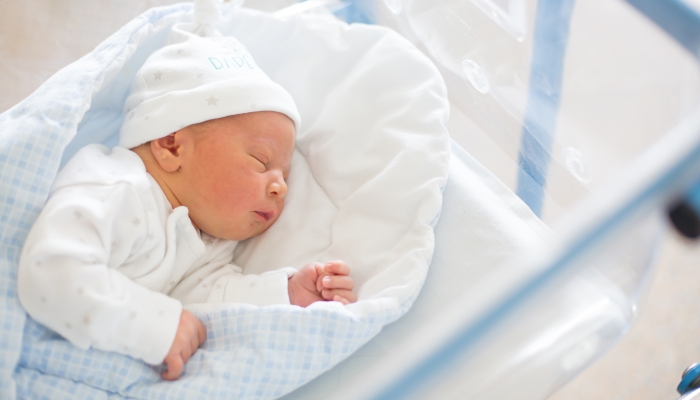
Is It Normal for Newborns to Snore?
Noisy breathing can be normal when a baby is congested or has a cold. The extra fluid and mucus can cause extra sounds or snores as your baby breathes and can worry new parents.
However, it’s time to contact your doctor if you notice the following symptoms:
- Your baby is unable to feed or sleep because of noisy breathing or is struggling to breathe.
- You hear strange noises (whistling, “singing,” or gurgling) during sleep.
- You suspect allergies or food intolerance.
- You note a total pause of breathing lasting greater than 20 seconds while sleeping (apnea).
- Your baby routinely pauses for breath during sleep (sleep apnea).
Evaluation by your doctor and treatment may be indicated in these instances.
What to Do to Stop Your Newborn From Snoring?
If your baby is snoring as a result of being sick, there are many things you can do to help improve congestion and ease breathing.
Try a Hot Shower
Think of this idea as a mini sauna treatment.
Strip your baby down to just their diaper and sit with them on the floor of the bathroom (you might want to bring some toys or books). Run a warm bath or hot shower and let the steam fill the bathroom.
Breathing hot, wet air tends to loosen extra mucus and improve a stuffy nose.
Nasal Suction
- 【3 Levels of Powerful Suction】The nasal aspirator for baby efficiently clears your little one’s stuffy nose. Gentle yet effective, Employs a soft suction to swiftly eliminate secretions and nasal congestion, ensuring your baby can breathe, sleep, and eat with ease
- 【A Soothing Way to Clean the Nose】Calm your fidgety or rolling baby with the soothing music of this nose sucker that holds their attention. It will make nose-cleaning easy, effective, and enjoyable. HEYVALUE baby nose sucker is a perfect Christmas Gift for every new parents
- 【Soft and Comfortable】Patented design by Pediatric ENT. HEYVALUE electric nose suction for baby comes with 3 food-graded silicone tips. Soft and flexible material ensures it is gentle and comfortable on your baby’s sensitive inner nasal surface
- 【Rechargeable & Portable】With up to 120 minutes of use after a full charge, this baby nasal aspirator is a must-have for on-the-go relief. It also includes a convenient storage box, making it easy for parents to carry around. (NOTE: The baby nose sucker will not operate while charging.
Your pediatrician may recommend using a nasal aspirator to help remove nasal secretions or refluxed milk. These devices are widely available at most pharmacies and are helpful in removing nasal blockages.
Remember to insert just the tip of the device into your baby’s nose—pushing the device in too far can cause injury to tender nasal passages and worsen baby’s breathing.
Consider a Humidifier
- 3-in-1 FUNCTIONALITY: Enjoy versatile usage by using the baby humidifier, diffuser, and nightlight together for a comprehensive experience or separately based on your needs, providing flexibility and convenience.
- ULTRASONIC COOL MIST HUMIDIFIER: Our baby humidifier converts water into a refreshing mist that runs up to 24 hours. The mist adjuster allows for a customizable experience, with a simple knob twist. The BPA-free water tank ensures safety and purity.
- COLOR CHANGING NIGHTLIGHT: Elevate your babies bedroom with a color-changing nightlight featuring a variety of hues, giving you control over a dreamy atmosphere for your little one.
- AROMATHERAPY DIFFUSER: Enhance breathing comfort by pairing with BreathFrida Vapor Drops (sold separately) for your little one. With a 0.5-gallon tank, it effectively covers up to 320 square feet, promoting a soothing atmosphere.
Using a humidifier in your child’s room while they’re ill can help provide wet air to ease congestion.
Other models attach to your home’s central heating system and can be more cost-effective over time, particularly if other family members also benefit from moist air.
Remember to change humidifier filters regularly to decrease mineral build-up and microbial growth, which can also make your baby sick.
Saline Drops
- BABY NASAL SALINE DROPS: Nasal Saline Drops by Boogie Drops contains non-medicated formula made with natural saline
- SPECIALLY DESIGNED FOR NEWBORNS: Extra gentle with a small dropper for small noses and a specially designed tip for controlled dropping and easy administration
- HELPS CLEAR AND MOISTURIZE SMALL NOSES: Helps ease baby’s congestion Gentle enough to use as often as needed – everyday or when cold, flu or allergy symptoms are at their worst
- TWIN PACK: Comes in a 2-bottle pack for more value and convenience
A saline solution is a sterile preparation of water and salt. It’s used in babies to help thin nasal secretions, as well as ease dryness of soft tissues and breathing airways.
This inexpensive remedy is widely available at many pharmacies and is an easy way to improve a stuffy nose.
Back to Sleep
The American Academy of Pediatrics states that the safest sleeping position for all infants is on their backs.
Letting your baby sleep in a side-lying or face down position places them at increased risk for rebreathing exhaled carbon dioxide, which can in turn lead to Sudden Infant Death Syndrome (SIDS).
Avoid Inclined Sleepers
Parents of older children may be tempted to elevate the head of their baby’s crib in order to help ease breathing.
However, using an inclined sleeper for an infant should be avoided.
New babies lack neck strength and the ability to adjust their own position. These underdeveloped muscles put them at risk of blocking their airway when sleeping in an inclined position.
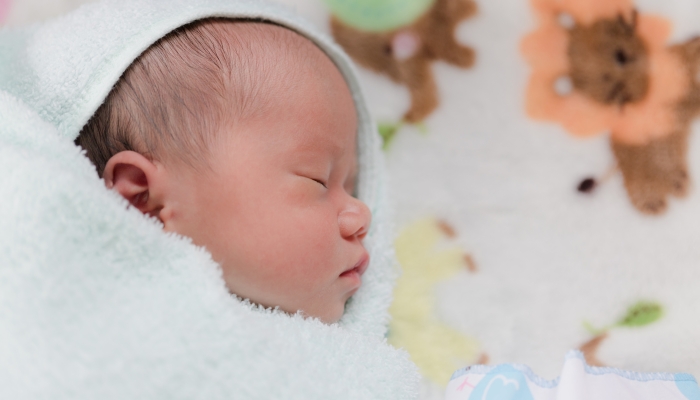
When Should Newborns Stop Snoring in Their Sleep?
It’s considered normal to hear extra noises and sounds as your baby sleeps for the first few months of life.
As your child grows, the diameter of their nasal passages and airway will increase, relieving snoring related to narrowing concerns.
However, if you notice that your baby is acting ill, snores in combination with unusual symptoms, or you have other concerns, contact your pediatrician.
Rest assured that snuffly baby snores are generally considered to be a normal part of an infant’s sleep and will gradually improve as your child grows.
FAQs
What is newborn laryngomalacia?
Laryngomalacia occurs because of a congenital (from birth) difference in your baby’s voice box (larynx). The soft, floppy tissues of the larynx can partially block the vocal cords when they fall over the baby’s airway.
Laryngomalacia can occur with or without obstructive sleep apnea.
Laryngomalacia has a distinct sound—infants with this condition tend to make a high-pitched, whistling noise when they breathe as opposed to the soft, snuffling sound of a baby snoring.
What is the difference between snoring and sleep apnea in newborns?
Babies who snore tend to make an occasional soft snuffling noise while they sleep.
Sleep apnea tends to sound more dramatic. Dr. Zarmina Ehsan at Children’s Mercy Sleep Center reports that sleep apnea in babies is marked by the following features:
- Baby routinely pauses for breath during sleep
- Baby gasps for air while sleeping
- Baby makes a choking sound in their throat while sleeping
- Persistent noisy breathing
- Difficulty breathing during all sleep including naps (sleep apnea is not limited to nighttime only)
If you suspect your baby has sleep apnea, contact your pediatrician. Further testing is indicated in order to make an accurate diagnosis.
Can pacifier use affect newborn snoring?
Short-term pacifier use has not been found to affect babies who snore.
However, long-term use (or overuse) of pacifiers has been found to potentially cause structural changes in a baby’s mouth, which can lead to snoring and apnea problems in children. Juliette Tamkin writing in Bioinformation on the Impact of Airway Dysfunction on Dental Health notes that long-term pacifier use is one of the main causes of anomalous facial development that can lead to upper airway disorders:
“Poor facial development and asymmetry are two of the most easily identified signs of airway dysfunction. Bottle-feeding, weaning to soft foods, thumb sucking, pacifier use, and mouth breathing are the main causes of poor facial development.”
If you choose to use a pacifier for your baby, try to limit use in order to avoid long-term issues.
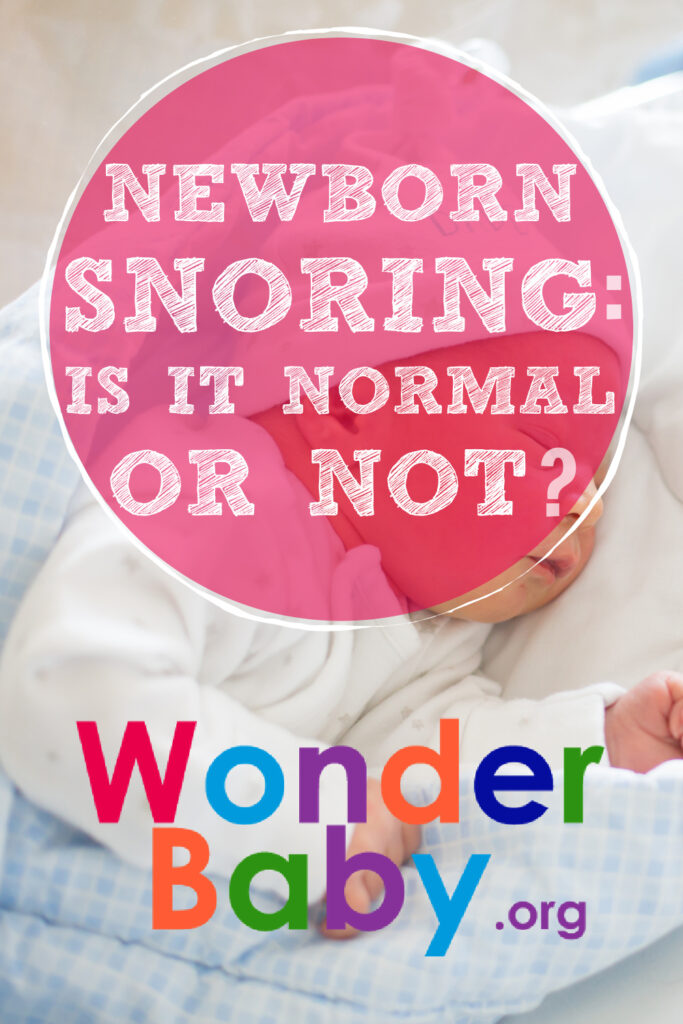
The information WonderBaby provides is not intended to be, and does not constitute, medical or other health advice or diagnosis and should not be used as such. Always consult with a qualified medical professional about your specific circumstances.
Related Posts
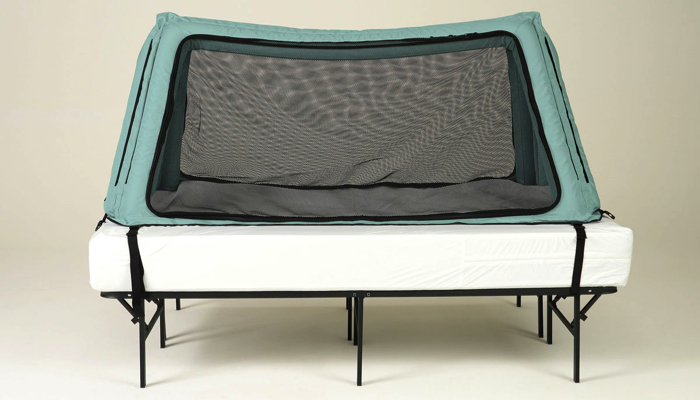
Sleep, Special Needs
Safe Place Bedding Travel Bed Review
Traveling with a special needs child can be stressful! Having a safe, durable, and easy to use travel bed can make traveling so much easier!
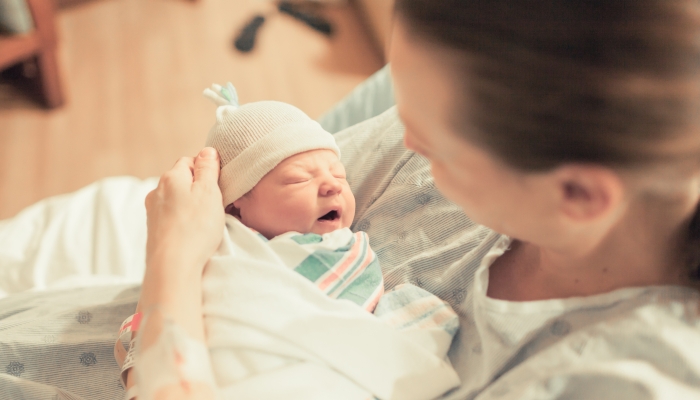
Sleep, Special Needs
Sleep Regimen for Premature Babies: Special Considerations
It can take premature babies much longer than their full-term peers to sleep for long stretches. A preemie sleep schedule may encourage better sleep.
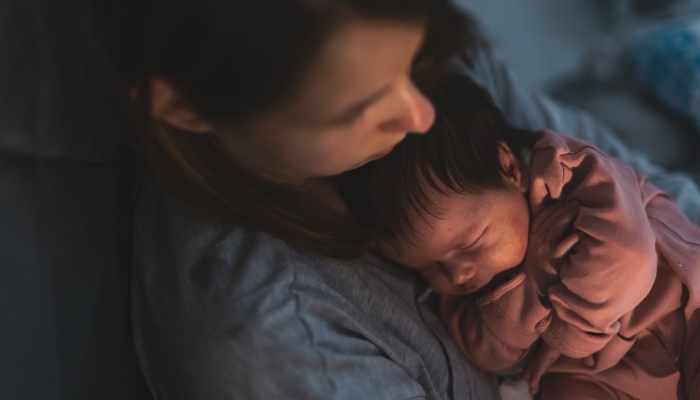
Sleep
Mastering the Bedtime Routine: 3 Tips for a Peaceful Night’s Sleep
From around six weeks, a newborn bedtime routine can help your baby learn the difference between day and night and prepare for a restful night’s sleep.


